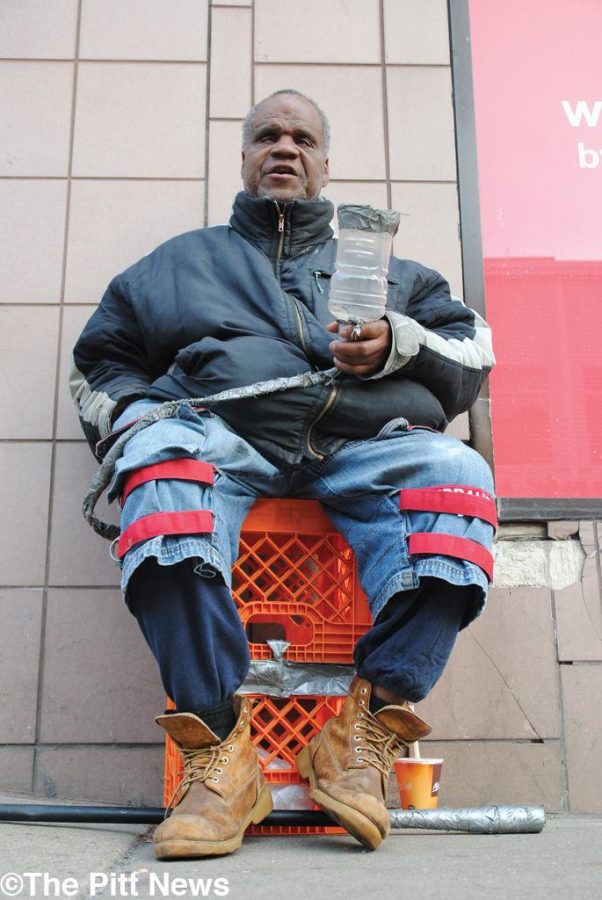For Bill: Crowdfunding worth singing about
September 1, 2014
Nearly every day, Oakland’s resident gospel singer Bill Dorsey takes his sidewalk stage outside the Rite Aid on Forbes Avenue with his boom box and walking stick.
But his song isn’t purely for pleasure. Dorsey, 65, is blind and has been street performing to earn money for nearly four decades.
Thousands of Pitt students navigate the busy street daily, and most of them likely pass Dorsey during their commute. While many students occasionally give him a few dollars, Elana Barkowitz wanted to harness more financial support.
Barkowitz, a 2011 graduate from Pitt’s Graduate School of Public Health, started a fundraising campaign on the crowdfunding platform, Go Fund Me, in January. Her page, titled “For Bill,” aims to raise $1,000 to assist with Dorsey’s food expenses. As of Sept. 1, the page received seven donations, totalling $195.
“I saw it as an opportunity for Pittsburgh residents and students alike to come together to help someone in need — someone they may recognize but may not have had a chance to personally meet,” Barkowitz said.
Life hasn’t shown Dorsey the same kindness that Barkowtiz is eager to supply.
Dorsey said he was sexually abused as a child and has suffered mistreatment at the hands of many different people in his lifetime. He added that he’s been arrested many times because of various altercations and was released from a job in his 20s.
“I traveled to Louisville, Ky. to find work, but records follow you everywhere,” Dorsey said.
After failing to regain the job he lost, Dorsey turned to singing for profit to afford food and rent — not drugs or alcohol. He said he doesn’t use any substances.
Barkowitz’s campaign for Dorsey was revitalized in July through the photography page of Zach Schaffer, who is also a photographer for The Pitt News. Schaffer posted a portrait of Bill on Facebook in January that gained more than 100,000 views as well as thousands of likes and shares. Barkowitz suggested that they work together on the fundraiser, so Schaffer re-posted his photo with a link to the fundraising page to publicize it.
Dorsey’s portrait and story garnered so much feedback, Schaffer said, because of his subject’s upbeat personality and notoriety in Oakland and around Pittsburgh. Dorsey is also the subject of a 30-minute documentary, called “Street Songs: Pittsburgh Street Singer, Bill Dorsey,” by Craig McTurk, an international documentary director and film editor.
“He sits out there singing beautiful gospel music everyday with an incredible voice,” Schaffer said. “From current students to distant alumni, everyone that had been in Pittsburgh for any period of time seemed to know who he was.”
Schaffer’s photograph attracted more than 1,200 comments from users, who often noted personal experiences with Dorsey.
“The CVS he sits in front of used to be an Eckerd that I worked at in college. Every cent that he earned, he came into Eckerd and spent on food and other necessary things,” Facebook user Mathew Rahimi posted.
Another Facebook user also recalled memories of Dorsey.
“I remember Bill from when I went to high school in Oakland 20+ years ago. He’s got a big voice and even a bigger heart,” Rich Frollini said.
Schaffer took the photo of Dorsey as part of a ongoing series called “They’re People Too,” through which he photographs downtrodden people on the street around the country along with a short backstory.
Dorsey was born blind. He attended a school for blind children, where he was dismissed or dropped out multiple times before leaving permanently at the age of 21. Many people want Dorsey to pursue his vocal talent professionally, but he declined. His childhood abuse ignited a fierce distrust of men, and Dorsey didn’t want a male manager.
“Show business is not like what people think it is,” Dorsey said. “I refused show business because I’m a one-man orchestra.”
Dorsey doesn’t mind the stigma attached to panhandling. When he hears someone place money in his cup, he tries to grasp and shake their hand, giving them a thunderous “God bless you.”
“I am not ashamed of singing in the street,” he said.
Despite the slow pace of the page’s donations, which has no deadline, Barkowitz isn’t worried about meeting the $1,000 goal. She and Schaffer will track the campaign’s progress and decide later when to give the money to Dorsey, who isn’t aware of the effort or the funds.
It can be difficult for people, especially students, to donate, Barkowitz said, but every dollar counts.
“If people are able and willing, a donation to Bill will make an impact on his life today, and it’s exciting to be a part of that,” she said.
Kendra Buffington donated to the page because she was touched by Dorsey’s story.
“The first time I ever heard Bill’s voice, I was honestly almost brought to tears… I was so amazed to see him sitting out there singing as if he had not a care in the world other than to bless others with his music,” said Buffington, a junior majoring in accounting.
If other Pitt students knew Dorsey’s story, Buffington said, they’d be more willing to help.
“Sometimes, it’s easy to ignore something or someone you know so little about,” Buffington said. “But once you learn his background and his struggle, it’s hard to walk past him every day without wanting to do something to help.”
The fundraiser’s purpose is to encourage others to help the man who has achieved a presence before residents and passersby in Oakland.
“I donated because I can,” Buffington said. “Five dollars isn’t nearly as valuable to me as it is to that man, and as long as I have the means to help, I will.”



